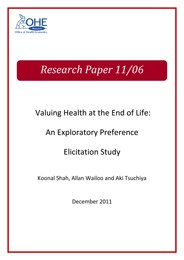In 2009, the UK’s National Institute for Health and Clinical Excellence (NICE) issued supplementary advice that its Appraisal Committees are to consider when assessing treatments that…
In 2009, the UK’s National Institute for Health and Clinical Excellence (NICE) issued supplementary advice that its Appraisal Committees are to consider when assessing treatments that extend life at the end of life. This includes an option for approving such treatments for use…
In 2009, the UK’s National Institute for Health and Clinical Excellence (NICE) issued supplementary advice that its Appraisal Committees are to consider when assessing treatments that extend life at the end of life. This includes an option for approving such treatments for use in the NHS if certain criteria are met, even if base case cost-effectiveness estimates exceed the range usually considered acceptable.
The policy thus places additional weight on the survival benefits for a small numbers of patients with terminal illnesses and short life expectancies. It assumes that this accurately reflects the societal preferences of the general public. However, little scientific evidence is available to support that premise.
Reported in this paper are the results of initial research to help fill the gap in evidence, completed by Koonal Shah of the OHE in collaboration with Aki Tsuchiya and Allan Wailoo of the University of Sheffield. This exploratory study was conducted in April 2011 with a convenience sample of 21 members of staff and post-graduate students at the University of Sheffield. The results provide some indication of public support for a policy that assigns higher priority to the treatment of patients with short remaining life expectancy and sudden disease onset.
The authors note that: “The most common driver of respondents’ choices was a concern about how much time patients have to ‘prepare for death’, which indicates, prima facie, support for NICE’s end of life policy. However, the ways in which information on patient age and the timing of treatment affected responses was not straightforward and in some cases contrary to the authors’ conjectured predictions. The results also suggest that improving quality of life is at least as, if not more, important than extending life in the end of life scenario.”
